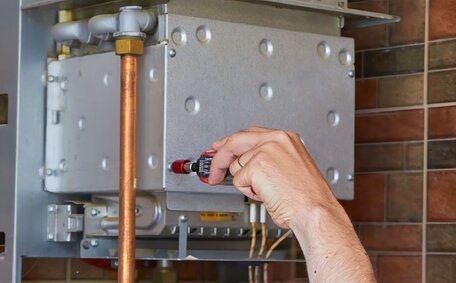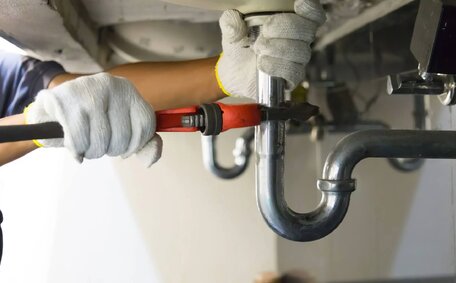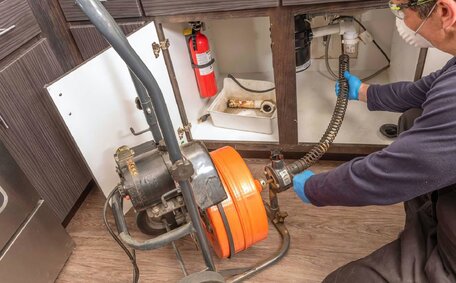Introduction to essential plumbing tips for homeowners
Maintaining your home’s plumbing system is essential for preventing issues and reducing the need for costly repairs. Regular maintenance and early detection of problems will keep your plumbing in top condition.
This guide details essential plumbing advice that every homeowner needs for effective maintenance. We’ll explore proactive measures to prevent clogs, inspect fixtures for early leak detection, and identify situations that require a professional plumber’s intervention.
Understanding key parts of your plumbing system
As a homeowner, it’s important to grasp the basics of your plumbing system. Understanding its components can help you with preventative maintenance, early detection of leaks, and knowing when professional help is needed.
Some of the main plumbing system elements you should know are:
- Water supply lines - These pipes bring water into your home and deliver it to fixtures like sinks, showers, and toilets. Check your plumbing fixtures regularly for leaks to ensure their longevity and efficient function.
- Drains - Properly functioning drains channel wastewater away, avoiding problems that can become costly. Clogs in these areas can cause backups and issues that can damage your home’s structure and interior. Know the path your drains follow.
- Sewer line - This underground pipe takes waste away from your house to the sewer system. Roots or shifting soil can cause sewer lines to break over time.
- Water heater - Regularly drain and flush your hot water heater to remove sediment, which prolongs its lifespan and maintains performance.
- Main water shutoff - This valve stops the water supply to your entire house, making it crucial to know how to shut off water supply when needed. Know where it is in case of leaks or bursts.
Understanding your plumbing layout and performing routine maintenance can be instrumental in forestalling costly repairs.
Locating your main water shutoff valve
Knowing the location of your main water shutoff valve can prevent extensive water damage in emergency situations and is a vital safety measure for any homeowner.
Locate the main water shutoff valve in your home before emergencies strike. It’s usually found where the main water line enters, such as the basement, garage, or utility closet, and may resemble a spigot or tap handle.
In the event of a sink overflow, pipe burst, or appliance leak, quickly turning off the main water supply can mitigate water damage. After securing the flow by turning the valve handle clockwise, enlist a licensed plumber to address the issue.
Label your shutoff valves clearly, especially the main one, and make sure your family knows its location. This precaution can prevent serious issues during sudden plumbing mishaps.
Performing routine plumbing maintenance
Routine checks and timely interventions can help prevent your plumbing system from deteriorating, maintaining prime condition and preventing future complications. Here are some tips:
- It’s crucial to inspect your pipes fixtures regularly for any leaks, corrosion, cracks, or damp spots.
- Regular leak inspections at fixtures maintain consistency across your property and stave off damage. Consistent water pressure between 40-80 PSI is ideal. Install a water pressure regulator if needed to ensure your optimal PSI levels for consistent water pressure.
- Annually draining some water from your heater removes sediment, preventing efficiency loss.
- To maintain a clear passageway in your kitchen, Pour hot water down your sink regularly to dissolve substances such as bar soap residue.
- Regularly clean your faucet aerators to prevent blockages that might impair water flow.
- Conduct annual toilet leak tests using dye tablets or food colouring in the tank. If colour appears in the bowl without flushing, there is a leak.
Developing a comprehensive maintenance schedule can save both time and money in keeping your plumbing system operating smoothly for years to come. Preventative care is crucial, as it can thwart small plumbing problems from escalating into big, expensive dilemmas, ultimately saving money over time.
Checking for leaks and pipe damage
Regularly check for leaks to prevent pipe and property damage. Small drips can waste significant amounts of water and inflate your bills.
Inspect all accessible pipes, including water supply lines and joints, for signs of leaks such as moisture or rust. Also, monitor your water meter for unexplained spikes that could point to hidden leaks.
Likewise, keep an eye out for early warnings of pipe damage like new stains on walls or ceilings, elevated humidity, and musty smells. Catching either leaks or pipe damage early allows for less expensive repairs before issues escalate.
Incorporate a routine leak check into your maintenance regimen. Annual inspections and swift action at the first sign of a leak can prevent severe water damage.
Cleaning drains to prevent clogs
Avoiding the most common plumbing issues includes keeping drains free of blockages, which is vital to avert backups and potential flooding. Observe these maintenance tips when it comes to preventing clogged drains:
- Weekly, pour a mixture of 1⁄2 cup baking soda and 1⁄2 cup vinegar down drains to prevent blockages. The chemical reaction dissolves hair soap scum, and other gunk.
- Pour boiled water down seldom-used drains to dissolve grease and prevent clogs.
- Use drain strainers to catch debris such as food scraps and excess paper, preventing improper disposal. Empty strainers often.
- Avoid chemical drain cleaners that can harm pipes and destruct garbage disposals. Try using a plunger drain snake or similar tool first instead.
- Properly dispose of cooking oil/grease. Allow it to cool and place it in a sealed container, instead of pouring it down the drain.
Good drain care habits can prevent blockages and subsequent plumbing disasters. A few minutes a week helps drains flow freely, avoiding major clogs.
Maintaining water heater efficiency
Maintaining your hot water heater’s efficiency is critical to ensuring constant access to hot water while minimising energy costs. Here are some tips:
- Drain a few gallons from the tank annually using the T&P valve to remove sediment buildup inside, which reduces efficiency.
- If your hot water heater is over 10 years old, consider replacing it to maintain efficiency. New models heat water twice as fast using less energy.
- Insulate hot water lines to prevent heat loss. Wrap the tank with insulation to reduce heat loss.
- Set the thermostat to 50-60°C to conserve energy.
- Check valves and supply lines for leaks yearly. Drips indicate worn gaskets/parts.
- Consider tankless water heaters which heat water on demand, saving energy and maximising efficiency.
Sticking to routine water heater maintenance preserves efficiency, delivering hot water while saving on monthly bills over time.
Preparing pipes for cold weather
In Dulwich Hill, Sydney, abrupt winter cold can risk pipes freezing and bursting. Take preventative steps to protect your plumbing before temperatures drop:
- Insulate pipes in unheated areas like crawl spaces, attics, basements or garages using store-bought or DIY pipe insulation wraps.
- Seal cracks and holes in exterior walls or foundations near water lines.
- Disconnect garden hoses. Install frost-free outdoor faucets.
- In very cold weather, slightly open indoor and outdoor taps to maintain water flow.
- Know the location of your main water shutoff valve in case pipes freeze and burst.
- Master how to isolate the main water valve to mitigate issues in specific problem areas within your home.
- Leave cabinet doors open overnight below sinks on outside walls so rising warm air reaches pipes.
Implementing cold weather preparation steps can go long way in keeping your plumbing system intact all winter. An ounce of prevention protects against frozen, ruptured pipes and costly water damage down the line.
Knowing when to call a professional plumber
Although minor plumbing repairs can be DIY projects, situations exist where a plumber’s expertise is essential:
- Major problems like slab leaks, sewer line breaks, or complete drain blockages often require specialised tools and expertise.
- Installation or replacement of appliances like water heaters and sump pumps is typically best left to professionals.
- Alterations to gas lines should only be handled by certified experts due to potential deadly risks if incorrectly handled.
- Updates or repairs needed to meet state plumbing codes and regulations need an experienced plumber’s oversight.
When it comes to addressing complex plumbing issues without proper training, you risk botched jobs, expensive property damage, personal injury hazards, and code violations, which is when to call a professional. Our team of licensed experts skillfully diagnoses and has specialised resources to fix problems correctly on the first try.
Avoid gambles with elaborate plumbing projects that might surpass your know-how. Calling professionals for major repairs or complicated installs is the wise, safe route for your home and family.
For major repairs and replacement
There are certain plumbing situations where attempting a DIY fix is not advised. Major issues like slab leaks, burst pipes, or complete sewer line blockages often require professional equipment and expertise to address.
Similarly, intricate replacements of components such as water heaters, sump pumps, gas lines, or your septic tank should be deferred to licenced plumbers. Improper installations can result in hazards, code violations, and failed inspections.
For major repairs or replacements, trust Dulwich Hill Plumbing’s call to a licensed plumber with their 30+ years of experience. Our licensed plumber team has advanced diagnostic tools and skills needed to proficiently manage complex plumbing tasks, including issues with your septic system. We handle tricky jobs like:
- Main sewer line repairs
- Whole-home pipe re-piping
- Total drain cleaning/unclogging
- Water heater installation
- Gas line re-routes and appliance hookups
- Burst pipe flooding control
For complex plumbing repairs and installations, trust professional plumbing services like Dulwich Hill Plumbing. Our experts with proper equipment ensure the job is done correctly, sparing you future complications.
For tricky locations and restricted access
There are certain plumbing components that can be difficult for homeowners to access, requiring professional equipment and skills:
- Pipes in cramped spaces like crawl spaces or attics may be hard to reach without proper tools and protective gear.
- Plumbing behind walls/under floors is tough to access without demolition. Our team can pinpoint issues using cameras.
- Clearing main sewer clogs requires powerful commercial drain machines many homeowners don’t own.
- Fixtures in hard-to-reach spots like above bathtubs or behind appliances need special wrenches/extensions.
Attempting DIY repairs in tricky locations risks further damage to your property. Our licenced plumbers have the advanced tools and training needed to safely access and fix hard-to-reach plumbing.
For pipes concealed behind walls or under floors, we use minimally invasive camera inspections to identity issues precisely without unnecessary demolition.
Don’t risk making problems worse through amateur repairs in difficult areas. Call our pros for safe, proper access and quality repairs the first time.
For gas lines and fixtures
Handling gas lines and fixtures requires specialised skills and expertise. As gas leaks can potentially cause fires, explosions, carbon monoxide poisoning, and other safety risks, only a trained professional should install, repair, or modify gas plumbing components.
Examples where a licenced plumber must be involved with gas systems include:
- Installing new gas lines, appliances like water heaters/furnaces, or outdoor amenities like pool heaters and fire pits
- Gas pipe leaks - can be identified through smell and pipe corrosion
- Re-routing or extending existing gas pipes
- Modifications when renovating rooms with gas fixtures
- Replacing old cast iron gas pipes prone to leaks
- Repairs to malfunctioning gas appliances like ovens or dryers
- Updating gas systems to meet changing building codes and safety regulations
Gas and appliances must be installed to strict specifications. Attempting DIY repairs risks deadly explosions. Our licenced team has advanced detection gear to identify leaks and years of specialised training to fix gas systems safely.
Don’t take risks with gas plumbing. Call Dulwich Hill’s professionals for reliable installation, timely leak detection, essential maintenance, and properly handling the unique risks and codes surrounding gas line repairs.






